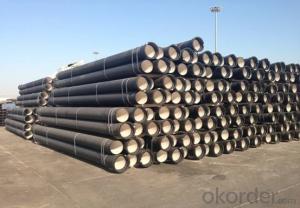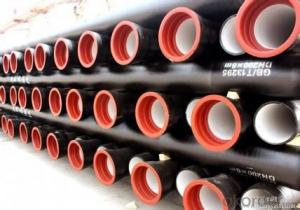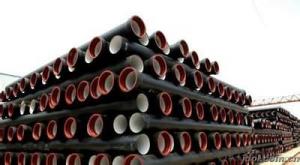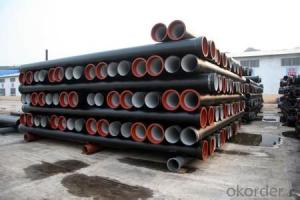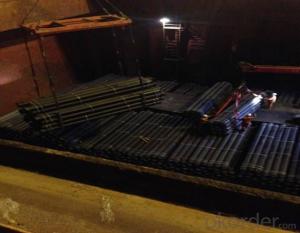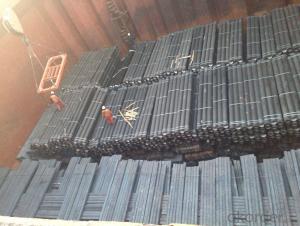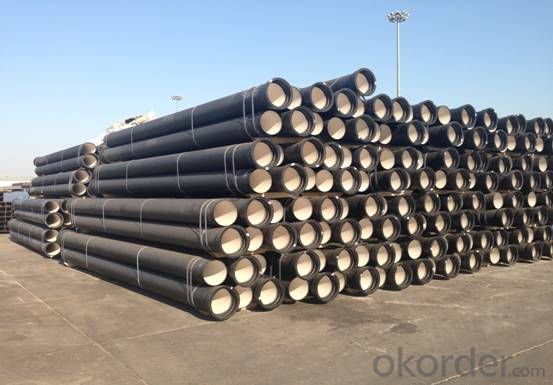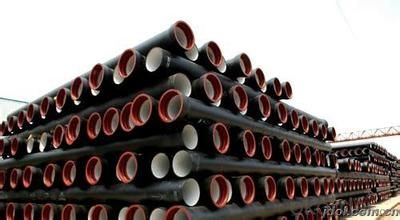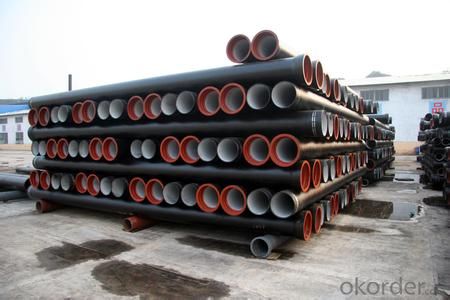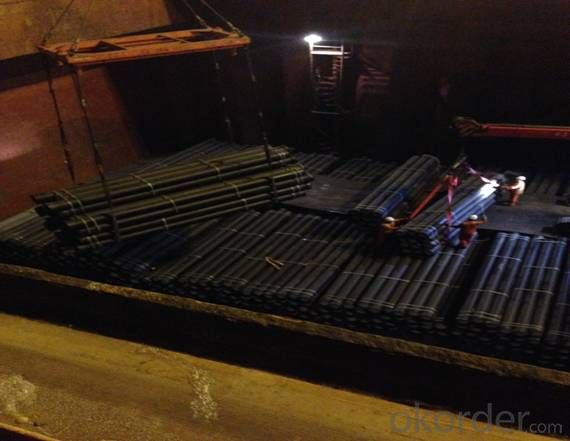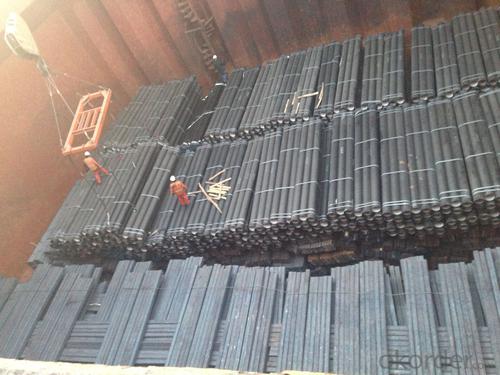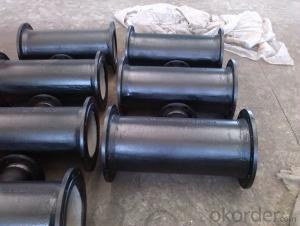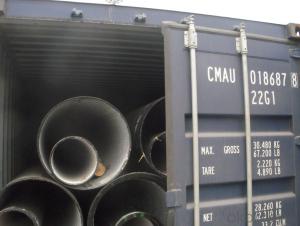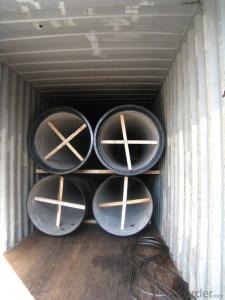DUCTILE IRON PIPE C Class DN1600
- Loading Port:
- China Main Port
- Payment Terms:
- TT OR LC
- Min Order Qty:
- -
- Supply Capability:
- -
OKorder Service Pledge
OKorder Financial Service
You Might Also Like
Ductile Iron Cast Pipe is without any defects compare with tradition casting tech, which has many advantages particularly as follow:
(1) High density. In the "vertical upward casting" process, the melt iron of centre liquid column in center crystallizer is continuously feeding for volume shrinkage caused by condensation tube at outer circumference , which lead to be free of shrinkage porosity.
(2) High purity. When melt iron pouring, the mixed impurities such as gas, dross, sand grain which are lighter than melt iron could be eliminated at furnace mouth, its impossible to enter into the crystallizer through the channel, so the melt iron into the crystallizer is very pure.
(3) Strength with toughness. The cooling speed provided by continuous crystallizer is 30 times than sand casting and 5 times than centrifugal casting, and doesn't produce white iron, the eutectic cell volume of continuous cast iron is one eighth to one tenth compare with traditional cast iron. The density of graphite nodule in ductile iron can reach 300-700 pcs/mm2. Therefore, all reason above improve the strength and toughness of continuous cast iron.
(4) Free machining. The high speed cooling make the hardening phase (such as boride, steadite) not appear like reticular, massive or thick, but diffuse like fish bone and pane in shape, moreover, there are tiny graphite flakes inlaid hardening phase. It's free machining in BrinellHardness the range of 250-300HB. However, the Brinell Hardness of 250 is top limit to common metal materials.
(5) Uniform composition of tube wall. The convection mixing of liquid column caused by marching type drawing in crystallizer make the composition of tube wall well-distributed, and concentration gradient very little.
(6) High productivity. To the wall thickness of tube under 10mm, the speed of continuous casting is 1 meter/min, to the wall thickness of tube under 20mm, the speed of continuous casting is 0.5 meter/min, which is high efficiency that centrifugal or other casting tech couldn't reach.
- Q: Are ductile iron pipes suitable for irrigation systems?
- Yes, ductile iron pipes are suitable for irrigation systems. Ductile iron pipes are known for their durability, strength, and resilience, making them an ideal choice for various applications, including irrigation systems. These pipes can withstand high water pressure and are resistant to corrosion, which is essential for ensuring the efficiency and longevity of an irrigation system. Additionally, ductile iron pipes have a smooth interior surface, minimizing friction and allowing for efficient water flow, ensuring that the irrigation system operates optimally. Moreover, ductile iron pipes have a long lifespan, reducing the need for frequent replacements and maintenance, making them a cost-effective option for irrigation systems. Overall, due to their durability, strength, corrosion resistance, and efficient water flow, ductile iron pipes are highly suitable for use in irrigation systems.
- Q: Can ductile iron pipe be repaired if it gets damaged?
- If ductile iron pipe sustains damage, it can indeed be repaired. The process of repair entails the removal of the damaged section and the subsequent substitution with a fresh section. Typically, a pipe cutter, a specialized tool, is utilized to achieve a seamless cut on both ends of the affected area. Once the damaged portion is extracted, a new section of ductile iron pipe is affixed securely by employing mechanical couplings or welding. To safeguard the pipe's integrity and functionality, it is crucial to adhere to the manufacturer's guidelines and industry standards during the repair procedure.
- Q: Are ductile iron pipes suitable for horizontal directional drilling (HDD) installations?
- Yes, ductile iron pipes are suitable for horizontal directional drilling (HDD) installations. Ductile iron pipes are known for their strength and durability, making them an excellent choice for HDD projects. HDD involves drilling a horizontal hole underground and pulling a pipe through it, which can be challenging due to the forces exerted on the pipe during installation. Ductile iron pipes can withstand these forces and maintain their structural integrity, ensuring a successful HDD installation. Additionally, ductile iron pipes have excellent corrosion resistance, making them suitable for various soil and environmental conditions encountered during HDD projects. Overall, ductile iron pipes offer the necessary characteristics to withstand the rigors of HDD installations and are a reliable choice for such applications.
- Q: Can ductile iron pipes be used for trenchless pipe rehabilitation methods?
- Yes, ductile iron pipes can be used for trenchless pipe rehabilitation methods. Trenchless methods such as cured-in-place pipe lining or pipe bursting can effectively repair and rehabilitate ductile iron pipes without the need for extensive excavation. These methods provide a cost-effective and efficient solution for rehabilitating aging or damaged ductile iron pipes while minimizing disruption to the surrounding environment.
- Q: What's the advantage of FCD50 ductile iron?
- The threading pipe threading pipe application of flame retardant PVC line pipe, the pipe wall surface should be smooth, the wall thickness required was not broken finger pinch strength, but also should have the certificate. You can also use the national standard galvanized pipe as threading pipe.
- Q: Do ductile iron pipes require additional protection against external factors?
- It is necessary to provide extra protection for ductile iron pipes due to external factors. Despite being strong and durable, ductile iron pipes are susceptible to corrosion and other threats that can cause pipe failure. The primary external factor that ductile iron pipes require protection from is corrosion. Corrosion can weaken the pipe over time and is caused by certain chemicals present in soil or water. To prevent corrosion, ductile iron pipes are often coated with substances like polyethylene or zinc. This coating acts as a barrier, safeguarding the pipe against corrosive elements and prolonging its lifespan. In addition to corrosion, ductile iron pipes may also need protection against physical damage. These pipes are typically buried underground, making them vulnerable to forces like heavy machinery, ground movement, and vandalism. To protect against physical damage, ductile iron pipes can be encased in concrete or surrounded by a protective sleeve or casing. Furthermore, ductile iron pipes may require protection against soil conditions that can lead to pipe movement or shifting. In areas with unstable soil, it may be necessary to implement measures such as proper bedding and backfilling techniques, as well as the use of anchoring devices. These measures ensure the stability and integrity of the pipes. To conclude, although ductile iron pipes are strong, they still need additional protection against external factors. This includes preventing corrosion, protecting against physical damage, and addressing soil conditions. By implementing these protective measures, the lifespan and performance of ductile iron pipes can be significantly extended, ensuring the reliable transportation of water and other fluids.
- Q: Are ductile iron pipes suitable for trenchless pipe ramming installations?
- Yes, ductile iron pipes are suitable for trenchless pipe ramming installations. They possess the necessary strength and flexibility to withstand the impact and vibrations caused during the ramming process. Additionally, their corrosion resistance and durability make them a reliable choice for trenchless installations, ensuring long-term performance and minimal maintenance requirements.
- Q: Can ductile iron pipes be used for underground storage tanks?
- Ductile iron pipes can indeed be used for underground storage tanks in certain situations. Ductile iron is a strong and durable material that is resistant to corrosion, making it suitable for underground applications. However, there are a few factors to consider before using ductile iron pipes for underground storage tanks. Firstly, it is important to assess the specific requirements and regulations of the project. Different regions and industries may have specific guidelines for the materials used in underground storage tanks. It is crucial to ensure that ductile iron pipes comply with these regulations and meet the necessary standards for underground storage. Secondly, the size and capacity of the storage tank should be considered. Ductile iron pipes are available in a variety of sizes, but they may not be suitable for large-scale storage tanks due to limitations in their dimensions. It is important to consult with engineers or experts to determine the appropriate pipe size and capacity for the specific storage requirements. Lastly, the design and installation of the underground storage tank should be carefully planned. Proper sealing and protection against external factors such as soil movements, water pressure, or other potential hazards should be considered. Adequate measures should be taken to prevent leaks or damage to the pipes, ensuring the safety and longevity of the storage tank. In conclusion, ductile iron pipes can be used for underground storage tanks, but it is essential to consider the specific requirements, regulations, sizing limitations, and proper design and installation. Consulting with professionals in the field and adhering to industry standards will ensure the successful use of ductile iron pipes for underground storage tanks.
- Q: How are ductile iron pipes protected against stray electrical currents?
- To safeguard water and sewer systems, ductile iron pipes are shielded from stray electrical currents through a technique called cathodic protection. This process entails the application of a low-voltage direct current (DC) to the pipes, generating a defensive electrical field around them. To achieve cathodic protection, sacrificial anodes or impressed current systems are installed near the ductile iron pipes. Sacrificial anodes, composed of a more electrically active metal like zinc or magnesium, are connected to the pipes and act as the electrical current source. Over time, these anodes corrode, sacrificing themselves to shield the pipes from corrosion caused by stray electrical currents. However, impressed current systems utilize an external power source to supply the protective electrical current. Rectifiers are employed to convert alternating current (AC) to direct current (DC), which is then administered to the pipes through anodes. This approach provides greater control over the amount of current applied, ensuring optimal protection. In both scenarios, the electrical current flowing through the sacrificial anodes or impressed current systems establishes a protective barrier around the ductile iron pipes. This barrier impedes the flow of stray electrical currents through the pipes, thus diminishing the risk of corrosion and prolonging the infrastructure's lifespan. Regular monitoring and maintenance of the cathodic protection system are crucial to uphold its efficacy. This involves inspecting the anodes, assessing the levels of electrical current, and making any necessary adjustments or replacements to maintain the desired level of protection. To summarize, cathodic protection is a dependable and widely utilized method for safeguarding ductile iron pipes against stray electrical currents. By preserving the integrity and longevity of water and sewer systems, it plays a vital role in ensuring their functionality.
- Q: Can ductile iron pipes be used in coastal or marine environments?
- Ductile iron pipes are applicable for coastal or marine environments. This type of cast iron has been treated with magnesium to enhance its strength, ductility, and resistance to corrosion. As a result, it can be used in environments with high moisture levels, like coastal or marine areas. Coastal and marine environments are characterized by their high saltwater levels, which can lead to metal pipe corrosion. However, ductile iron pipes possess an excellent resistance to corrosion thanks to their protective coating. This coating acts as a barrier between the pipe and the corrosive elements present in saltwater, preventing rust formation and prolonging the pipes' lifespan. Moreover, ductile iron pipes can withstand the high pressures and stresses associated with coastal and marine applications. They possess high tensile strength, enabling them to support the weight of soil, rocks, and other materials that may be present in these environments. Furthermore, ductile iron pipes are resilient to damage caused by external forces like waves or debris, making them a dependable choice for coastal or marine projects. In conclusion, ductile iron pipes are a suitable option for coastal or marine environments due to their corrosion resistance, high tensile strength, and durability. They can reliably transport water or other fluids in these challenging environments while maintaining their structural integrity for an extended period.
Send your message to us
DUCTILE IRON PIPE C Class DN1600
- Loading Port:
- China Main Port
- Payment Terms:
- TT OR LC
- Min Order Qty:
- -
- Supply Capability:
- -
OKorder Service Pledge
OKorder Financial Service
Similar products
Hot products
Hot Searches
Related keywords
